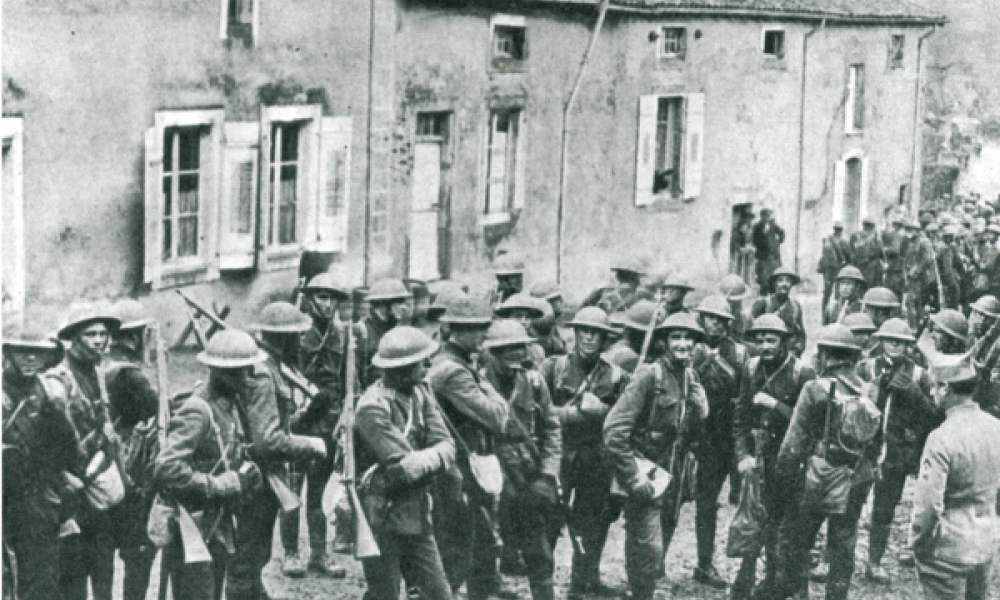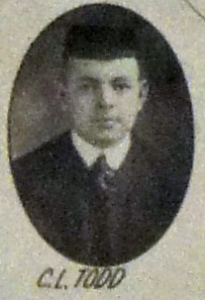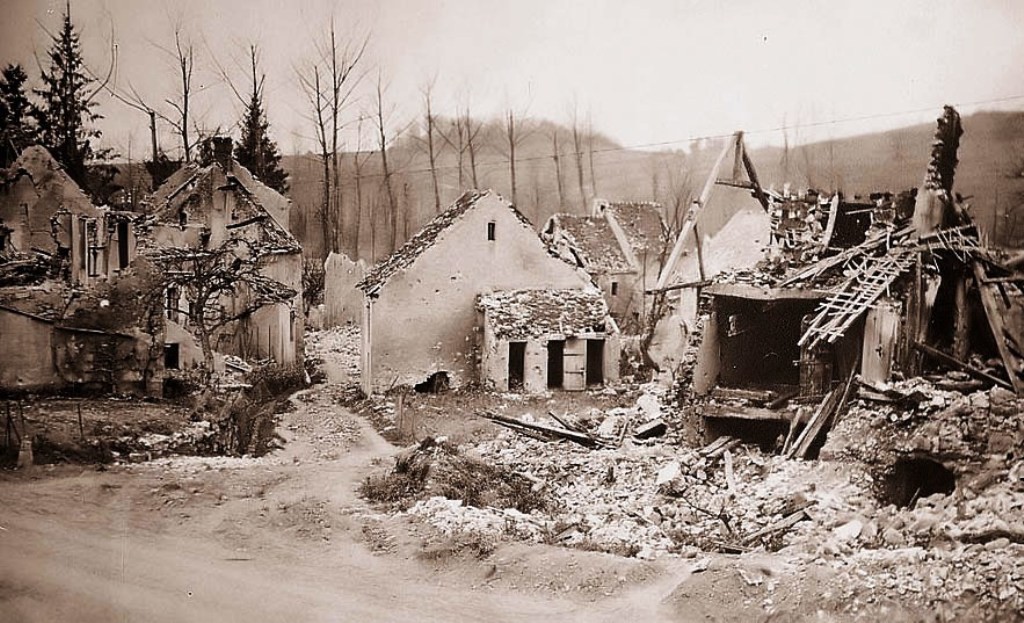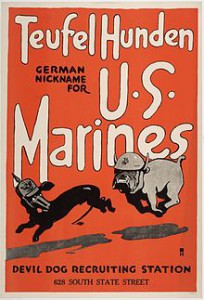On Memorial Day in 1918, Clyde Todd ’20 marched directly into one of the most violent battles of World War I. He shared his memories of this World War I military service in The Transcript, the Chicago-Kent College of Law yearbook.
Years later, we continue to honor and remember those who did not come home, including many of our own students and alumni.
Military Service & Law School
On Christmas Day, 1918 Clyde Todd stood on the deck of a great vessel leaning and shuddering in preparation for its departure from the city of Bordeaux, France. He was anxious to watch it all shrink into the distance, until it was barely a speck on the horizon.
He hoped he wouldn’t be the only one to cheer when it disappeared behind him. The sun was finally shining after weeks of downpour, and the 6th Marine Regiment was finally heading home.
The following spring, Todd wrote about his military service for the 1919 issue of The Transcript. He began by describing the feeling of returning to law school after the war, of the difficulty in believing that his military service had been anything more than a vivid dream:
“I assure you when we enter the halls…there is a feeling which to me is much the same as that which I always imagined must have come to Rip Van Winkle, when he returned after his years of absence from society. Many of our experiences are hard now to believe as actualities. Although you naturally refrain from condemning your own eyes, yet often you wonder if they were not deceiving you.”
Training Experiences
On St. Patrick’s Day in 1918, Todd was far from home, marching with his regiment into the historic city of Verdun. For months, they had been moving through a string of towns in central and eastern France, growing ever closer to the violence and threat of the enemy. The city had been mightily defended by the French through almost a year and a half of bloody attacks by German troops.
By the fall of 1917, the German offensive had been reduced, and American troops began to move into the area. Though he acknowledged that the bloodiest fighting in the city had been over for some time, he noted that holding the area was no easy task:
“Coming here for the first time we looked upon our experience as severe hardships…[O]ur experience here for about seven weeks served as a training to prepare us for the test which we were to stand later.”
Memorial Day 1918
The test came at the end of May. A small celebration of the Memorial Day holiday came to a halt when orders came from the command at Chateau Thierry, an area just under 40 miles from Paris, which German forces were attempting to enter. The order, blunt and chilling, tore through the regiment and sent 30,000 men toward the front lines: “For God’s sake, send troops.”
The entire division rode in a long line through town after town, mile after mile, on the backs of trucks. Through the first several small towns, the trucks slowed to allow crowds of people to part in the streets.
“The people had been cheering as we passed all day long, but it was here in Meaux where the streets were lined with women and children that we got the heartiest welcome. Flowers were thrown to us as we passed and from their generosity it seemed they must have had an endless supply.”
The city of Meux was a mere 15 miles from the fighting at Chateau Thierry, and it was in these last few miles of the journey that the mood changed dramatically.
“It was about two o’clock in the afternoon that we began to meet old men, women and children; babies carried in their mothers’ arms and all they had in the world was on their backs, traveling those dusty, hot roads…Oftentimes, those women with tears in their eyes would look up at us, with a ray of hope coming through their tears…It was on these last kilometers that we experienced that which made us a fighting unit and a formidable foe for the enemy.”
The soldiers resolved, some of them aloud, to beat the German forces or die trying.
Battle of Belleau Wood

Marines of the 5th and 6th Regiment arriving in France shortly before the battle of Belleau Wood. (Semper Fi: The Definitive Illustrated History of the U.S. Marines)
Over the rocky, hilly terrain of the area, through the thick underbrush and timber forests, the German army had advanced. The 7th French Army Corp had fought for weeks under constant, heavy fire, suffering many casualties, to hold the line against the advance of the enemy. On the evening of June 1, 1918, German forces managed to push through the French lines, and Todd’s regiment marched 6 miles and closed the gap by dawn.
By the afternoon of June 3, the German advance on the cities of Marigny and Lucy through Belleau Wood was halted by Marines who bravely held their positions in a grain field until the enemy was within 100 yards. With the enemy now enclosed in Belleau Wood, Todd’s regiment charged forward into the darkness of the woods, where the German guns were well-camouflaged and took down nearly 75% of French and American forces.
For days, Todd and his remaining fellow soldiers hid in shallow trenches, holding position. They waited, bombardments and bullets cracking overhead, until June 11, when their ranks were replaced. They pushed forward and finally cleared the woods on June 28.
Aftermath of the Battle
In the days that followed, Todd marched and fought his way through small towns and crawled through wheat fields. He lost many comrades during this time, and saw much destruction. “In Lucy,” he wrote, “when we left there the only sign of life was one old hen…Many of our comrades lost their lives in this town.” He saw fellow soldiers fall and narrowly escaped the same fate as they advanced through Boureches, Vaux, and Louy:
“I was one of a party of six…one night about eleven o’clock and a shell killed four of our party at a well after water. It was a common thing for a man to go out for necessaries and be killed.” Finally, by the end of July 1918, German forces were retreating and Todd’s division left the area, “as barren as if a fire had gone through it.”
Devil Dogs of America
Through the fall of 1918, Todd’s division traveled down the line as a shock unit. They took part in the fighting near Soissons in late July, St. Mihiel in September, on the Champagne front in October, and the Argonne Forest in November.
By December, the second division’s casualties were the heaviest in the American Expeditionary Forces, with 23,491 lives lost. Decorations awarded for unusual acts of bravery and heroism, at 1,221, outnumbered those awarded to any other division.
Todd’s brigade was awarded the Croix de Guerre with palm, the highest honors to be awarded to a unit. After the Battle of Belleau Wood, the German press termed them the “Devil Dogs of America,” a name they proudly accepted as an honor.
Reflecting on the War
In 1919, Clyde Todd wandered the halls of Chicago-Kent as if he were only half experiencing it, as if a part of himself had been left behind in the brush in the Belleau Wood, and another part of himself had never left law school.
In his account of his experiences during the war, he describes an almost surreal hellscape, almost too frightening to believe. Still, he felt pride in his service to his country, writing
“We are proud to have taken part in this great war the way in which we did, and I assure you life has a different aspect to us. We realize we have been through hell as every other man does who had the experience of the war.”
Todd, upon his return, urged the community to take the Allied victory as an opportunity to support one another:
“It is my earnest hope that the boys will work together as they have fought, and enjoy the fruit of victory as we shared the hell in battle. And the men of the Kent College of Law and Alumni of this school, many of you who have taken part directly in this great task and others who have lended a hand, and their support, with our comrades in arms, can weld a great influence on the future of the world and this great republic, so that we and our children may enjoy the right for which many of us fought and gave our blood and lives.”
To read his entire account, “The Devil Dogs,” download the Military section of the 1919 Transcript. For more letters from Chicago-Kent students and alumni in active service, see the Military section of the 1918 Transcript.



